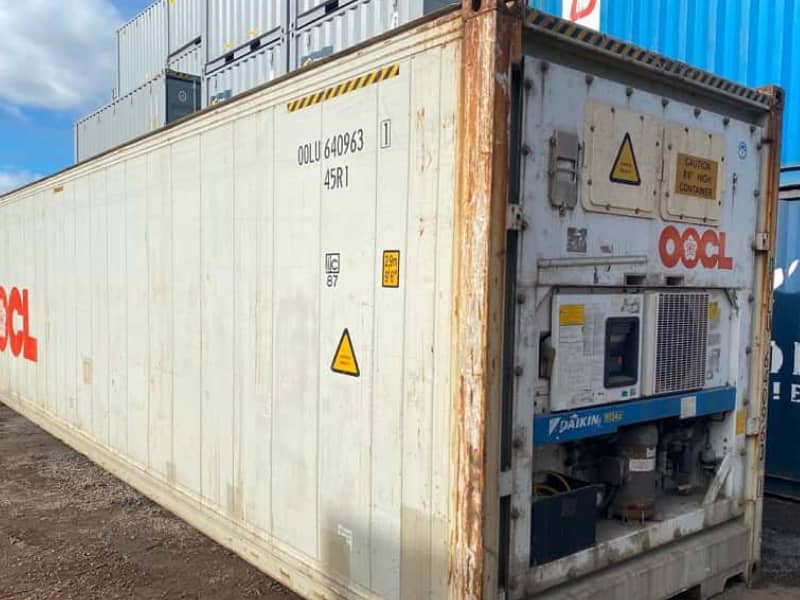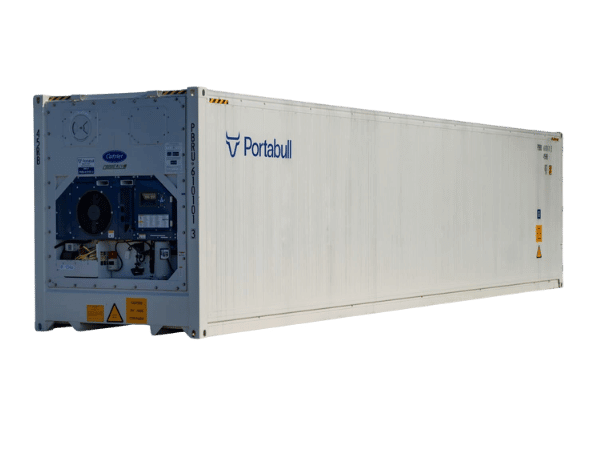Everything About Cold Storage Space Containers: Necessary Insights for Your Storage Requirements
Freezer containers play an essential function in the conservation of subject to spoiling products. They come in numerous types, consisting of cooled and insulated devices, each developed for specific storage requirements. Comprehending the benefits and crucial features of these containers is essential for organizations aiming to maximize their operations. As the need for efficient storage space services grows, exploring the various options offered can lead to educated decisions that affect both profitability and sustainability. What variables should one take into consideration when choosing the right container?
Types of Cold Store Containers
Freezer containers come in different types, each created to fulfill particular temperature control requirements. Amongst the most common types are refrigerated containers, which preserve temperatures between 0 ° C to 10 ° C, making them appropriate for disposable products like fruits, vegetables, and milk items. An additional kind is the deep fridge freezer container, which operates at temperatures below -18 ° C, suitable for long-lasting storage of icy items such as meats and fish and shellfish.
Shielded containers supply temperature level security without energetic air conditioning, making them useful for short-term transportation of temperature-sensitive items. Furthermore, there are portable freezer devices, which provide versatility in locations and are commonly utilized in events or seasonal procedures. Lastly, blast chillers swiftly decrease the temperature of warm foods, guaranteeing safety and top quality. Each type serves an unique objective in different industries, from food service to drugs, highlighting the value of selecting the appropriate container for details storage space requirements.

Advantages of Utilizing Cold Store Solutions

In addition, cool storage solutions expand the service life of things, lowering waste and boosting success for businesses. By efficiently managing supply with correct temperature control, firms can optimize their supply chains and enhance functional effectiveness.
In addition, cold store centers allow for adaptable storage alternatives, accommodating numerous quantity needs and seasonal changes in need (used 40ft refrigerated shipping containers). This versatility aids organizations respond swiftly to market changes
Employing cool storage space solutions can assure compliance with health and security laws, guarding both consumers and services. Overall, the strategic use freezer enhances product management while advertising sustainability and economic viability.
Secret Attributes to Seek in Freezer Containers
When selecting cold store containers, several essential attributes merit careful consideration to secure peak efficiency and integrity. Temperature level control capacities are important; containers should maintain consistent temperatures suitable for particular products. Insulation quality likewise plays a significant role, as superior insulation reduces energy intake and boosts temperature security.
Next, convenience of accessibility and loading is critical; containers need to supply straightforward layouts for reliable handling and company. Sturdiness is an additional essential aspect; weather-resistant products ensure longevity and safeguard materials against environmental aspects.
Furthermore, flexibility attributes, such as built-in wheels or raising points, facilitate transport, while customizable designs allow for customized storage options.
Finally, monitoring systems, consisting of temperature alarm systems and remote tracking, provide real-time updates, making sure that problems stay perfect. By concentrating on these functions, users can choose freezer containers that satisfy their operational demands effectively.
Picking the Right Cold Store Container for Your Needs
Selecting the appropriate cold store container requires a thoughtful evaluation of details needs and operational requirements. Factors such as the type of products being kept, temperature sensitivity, and quantity ought to be focused on. Subject to spoiling food items might necessitate containers with strict temperature controls, while drugs may need accurate problems to preserve effectiveness.
In addition, possible users must consider the container's dimension and mobility. A bigger device might be essential for bulk storage space, while smaller sized, mobile choices might be excellent for momentary or on-site requirements. Insulation high quality and energy efficiency are likewise important, as these will certainly affect operational costs and temperature stability.
Conformity with sector guidelines and requirements is important, particularly in markets like food and medical care. By meticulously reviewing these elements, individuals can select a freezer container that effectively fulfills their unique demands and assurances optimal storage space conditions.
Ideal Practices for Maintaining Cold Storage Issues
Maintaining ideal cold store problems is vital for preserving the top quality and security of temperature-sensitive products. Frequently keeping an eye on temperature and moisture levels is critical; making use of trustworthy digital thermostats and hygrometers can offer exact analyses. Appropriate insulation of cool storage containers assists decrease temperature level changes and power loss.
Executing a first-in, first-out (FIFO) system assures that older inventory is utilized before newer supply, decreasing waste (used 40ft refrigerated shipping containers). In addition, maintaining an arranged format within the storage space permits for much better air movement and reduces the danger of cross-contamination
Regular upkeep checks on equipment, such as seals and compressors, are essential to stop breakdowns. Staff training on best practices for packing and discharging items aids keep temperature level integrity. Finally, keeping doors closed as long as possible restrictions warmth exchange, ensuring that the freezer environment remains efficient and steady in protecting beneficial items.
Expense Considerations for Cold Store Solutions
When assessing freezer options, it is important to take into consideration the first financial investment expenses alongside ongoing functional costs. A detailed failure of these expenses can reveal substantial lasting cost savings potential for businesses. Recognizing these financial aspects helps stakeholders make educated choices regarding their cool storage needs.

First Financial Investment Prices
The economic landscape of cold store containers provides different preliminary investment expenses that companies need to take into consideration. These expenses commonly consist of the acquisition or rental cost of the containers, which can vary based on size, type, and insulation high quality. Furthermore, costs associated with retrofitting existing structures to suit freezer needs to be factored in, especially if specialized equipment is called for. Setup expenses, including electric job and refrigeration systems, also add to the total first financial investment. Companies ought to not ignore transport expenses for providing containers to their desired area. Ultimately, prospective customization options, such as shelving or temperature level tracking systems, can even more influence the preliminary financial expense. Mindful budgeting for these aspects is crucial for effective cold store application.
Functional Costs Break Down
Functional expenses for cold store solutions include a number of essential price factors to consider that businesses should navigate. Secret elements include power expenses, which can be significant because of the demand to maintain low temperature levels. Maintenance costs are also significant, as normal servicing is necessary to guarantee devices runs efficiently and continues to be compliant with health and wellness and safety and security criteria. Additionally, labor prices may occur from the requirement for specialized team to monitor the storage and handle atmosphere. Insurance policy costs are an additional factor to consider, as companies have to protect their investments against potential losses. Lastly, any kind of possible regulative conformity prices must be factored in, as services might require to spend in systems that stick to food safety and security and environmental laws. Comprehending these costs is essential for effective budgeting.
Long-Term Savings Prospective
Purchasing freezer solutions provides substantial long-lasting financial savings capacity, transforming first expenses right into economic efficiency over time. By reducing putridity and waste, organizations can improve their profit margins substantially. Advanced insulation and energy-efficient systems minimize energy costs, that site which gather over the life expectancy of the devices. Furthermore, freezer containers frequently require much less regular maintenance contrasted to standard refrigeration techniques, leading to reduced fixing costs. The capacity to store items for prolonged durations without jeopardizing quality permits organizations to profit from market changes, optimizing revenue. Furthermore, the scalability of freezer remedies enables business to adapt to changing needs without sustaining excessive costs. In general, these factors contribute to an engaging situation for cold storage as a cost-efficient investment method.
Often Asked Concerns
Exactly How Lengthy Can Food Be Stored in Cold Store Containers?
The duration food can be kept in cold store containers differs by type. Generally, perishable items last from days to weeks, while icy foods can stay risk-free for months, relying on appropriate temperature level and storage space conditions.
Are Cold Store Containers Energy-Efficient?
The energy efficiency of freezer containers differs based upon layout and insulation top quality. Modern devices typically make use of innovative look at here technology to minimize power usage, inevitably adding to reduced operational costs and environmental impact in long-lasting use.
Can Cold Storage Containers Be Custom-made for Details Requirements?
Cold store containers can certainly be customized to satisfy certain requirements. Modifications might consist of temperature level controls, dimension modifications, and extra attributes, permitting customers to tailor services effectively for numerous storage space demands and functional choices.
What Are the Usual Sizes of Freezer Containers?
Cold storage containers commonly come in conventional sizes such as 10, 20, and 40 feet. These measurements fit numerous storage space requirements, guaranteeing flexibility for organizations needing temperature-controlled environments for perishable goods or sensitive products.
Do Cold Store Containers Require Special Licenses for Usage?
Freezer containers frequently call for special permits for usage, depending upon neighborhood laws and planned applications. Authorities may mandate authorizations to assure security requirements, environmental conformity, and correct functional methods are preserved during their application.
Cold storage space containers come in different kinds, each made to fulfill details temperature control requirements. In addition, cold storage centers permit for flexible storage choices, accommodating numerous volume requirements and seasonal changes in need. Selecting the ideal chilly storage container calls for a thoughtful analysis of specific requirements and functional needs. The economic landscape of cold storage space containers presents numerous initial financial investment costs that organizations need to think about. Cold storage space containers can undoubtedly be personalized to fulfill details useful content needs.